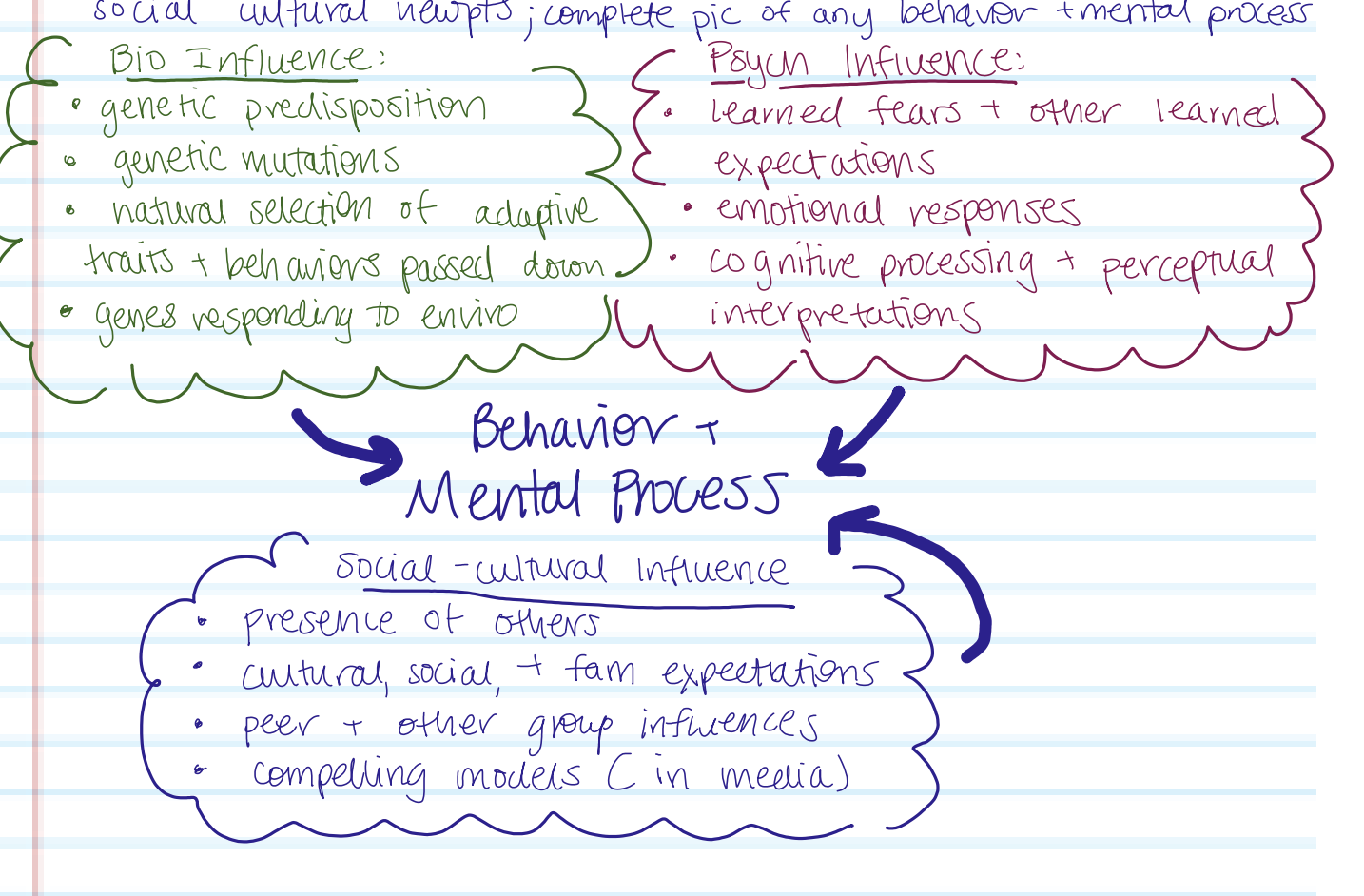Unit 0
1/42
Earn XP
Description and Tags
History, Approaches & Research Methods
Name | Mastery | Learn | Test | Matching | Spaced |
|---|
No study sessions yet.
43 Terms
Structuralism/Introspection
Edward Bradford Titchener and William Wundt; aim to classify and understand elements of mind's structure; train people to be self reflective or introspective; bad technique - high variability and low reliability
Functionalism
explore how mental and behavioral processes function and how they enable an organism to adapt, survive, and flourish; William James and Charles Darwin
Empiricism
idea that knowledge comes with experience; observation and experimentation enable scientific knowledge
Psychoanalysis
Sigmund Freud; emphasize how unconscious mind and childhood experiences affect our behavior typically through talk therapy
Behaviorism
Pavlov, Watson, Thorndike, and Skinner; Looking only at people’s behavior to understand how they learn and what they learn; Classical (involuntary) vs. Operant (voluntary); difference comes down to stimulus and response and when either is introduced
Socrates and Plato
mind separable from body and continues after body dies; knowledge is innate and born with us
Aristotle
use data; knowledge is not preexisting and grows from experiences stored in memories
Renes Descartes
nature
John Locke
nurture; tabula rasa: blank slate
Francis Bacon
mind's hunger to percieve patterns in random events
Humanistic Psychology
Personal growth and fulfillment
Cognitive psychology
encode, process, store, and receive information
Evolutionary psychology
natural selection and gene survival
Biological Perspective
Genes, body, and brain affect our emotions, memories, or sensory experiences
Sociocultural perspective
variation across cultures
Biopsychosocial model
integrated approach that includes bio, psycho, and socio-cultural viewpoints

Hindsight Bias
predictability, inevitablity, and memory distortion from experimenter pov (after study)
looking back and saying “i knew that was going to happen”; if something bad happens saying “how did you not see the signs → looking back didn’t know outcome so couldn’t predict
Confirmation bias
the tendency to interpret new evidence as confirmation of one's existing beliefs or theories.
cherrypick things, only looking at details that confirm what you believe, only seeing things from ur pov (start of the study)
Overconfidence bias
a cognitive bias in which a person's subjective confidence in their judgments is reliably greater than their objective accuracy
Illusory Correlation
people believe a relationship exists between two variables or events that are not actually related
Case Study
Looking deeply and fully into one particular situation or person; close look on specific issue; hard to replicate findings and can't generalize
Naturalistic Observation
To study a subject in their natural environment; may yield more authentic results; may not display the behaviours you hope to see so makes causation impossible since behavior changes when watched
Survey method
Cheap, easy, usually quick, and anonymous so more honesty; Impersonal - often lacking in detail or context, people will often lie
Longitudinal Study
To study a group or person over a long period of time to understand change throughout the life span; Hard to keep track of people, some may leave or drop out of study, which can invalidate some of the results
Experiment Method
The most restrictive of all studies, where most aspect of the study are controlled by the experimenter; can infer causation; behavior may be unnatural because the setting is so fixed
Hypothesis
a research question
Independent Variable
the thing you change
Dependent Variable
the thing you measure
Experiment Groups
the group that gets treatment
Control Group
the group that gets no treatment or a placebo; baseline data to compare
Placebo
a sugar pill that has no medicinal value
Placebo Effect
the idea of treatment is enough to cause a
measurable effect
Single Blind
subject doesn't know which treatment they are recieving
Double Blind
subject and experimenter don't know which treatment is recieved, common in medical experiments
Positive Correlation
both factors move in the same direction (increase OR decrease together)
Negative Correlation
factors move in opposite directions (one increases while the other decreases)
No Correlation
factors do not seem to have a relationship; Correlation does not equal Causation
Standard Deviation
Calculate the mean (x̄):
Find the squared difference from the mean for each data point:
Sum the squared differences:
Calculate the variance:
Divide the sum of squared differences by n-1. So, if there are 4 data points, n-1 = 3.
Calculate the standard deviation (s):
Take the square root of the variance.
Informed Consent
person's right to autonomy and self-determination, ensuring they receive comprehensive, understandable information about a medical or research procedure to make a free and voluntary decision
Debriefing
researchers fully inform participants about the study's goals, procedures, and any deception used, while also providing support for any distress experienced
Confidentiality
duty to protect privileged or sensitive information shared within a professional relationship, ensuring it is not disclosed without consent
Protection from Harm
requires minimizing risks and preventing harm to participants; mental or physical
Use of Deception
requires a strong scientific justification, minimal risk to participants, a lack of non-deceptive alternatives, and comprehensive debriefing